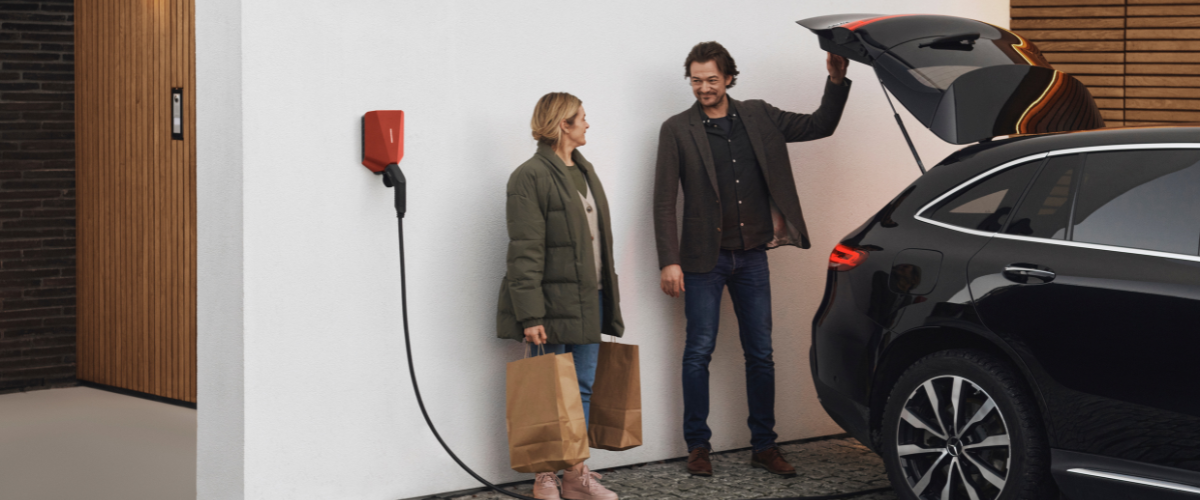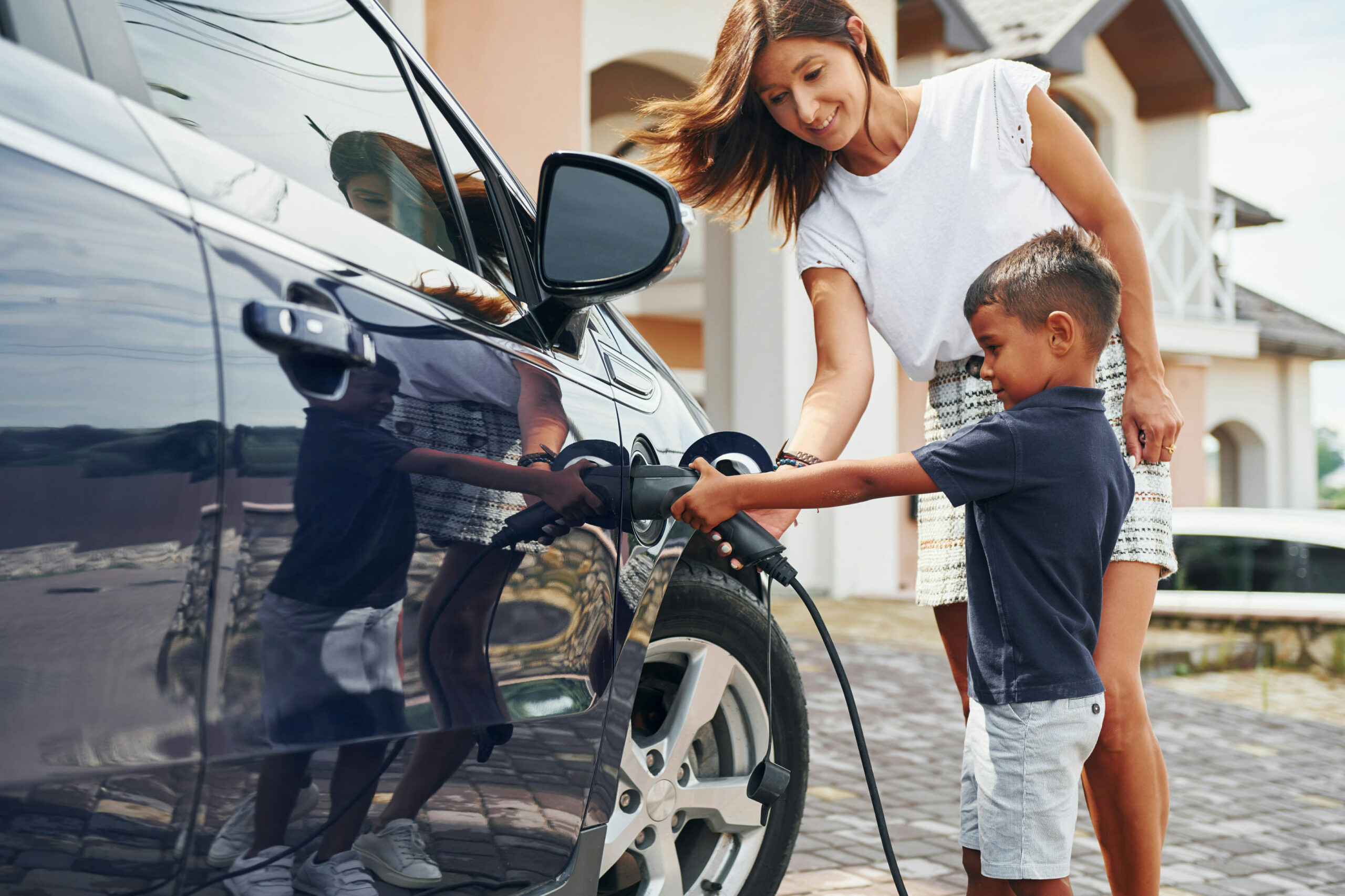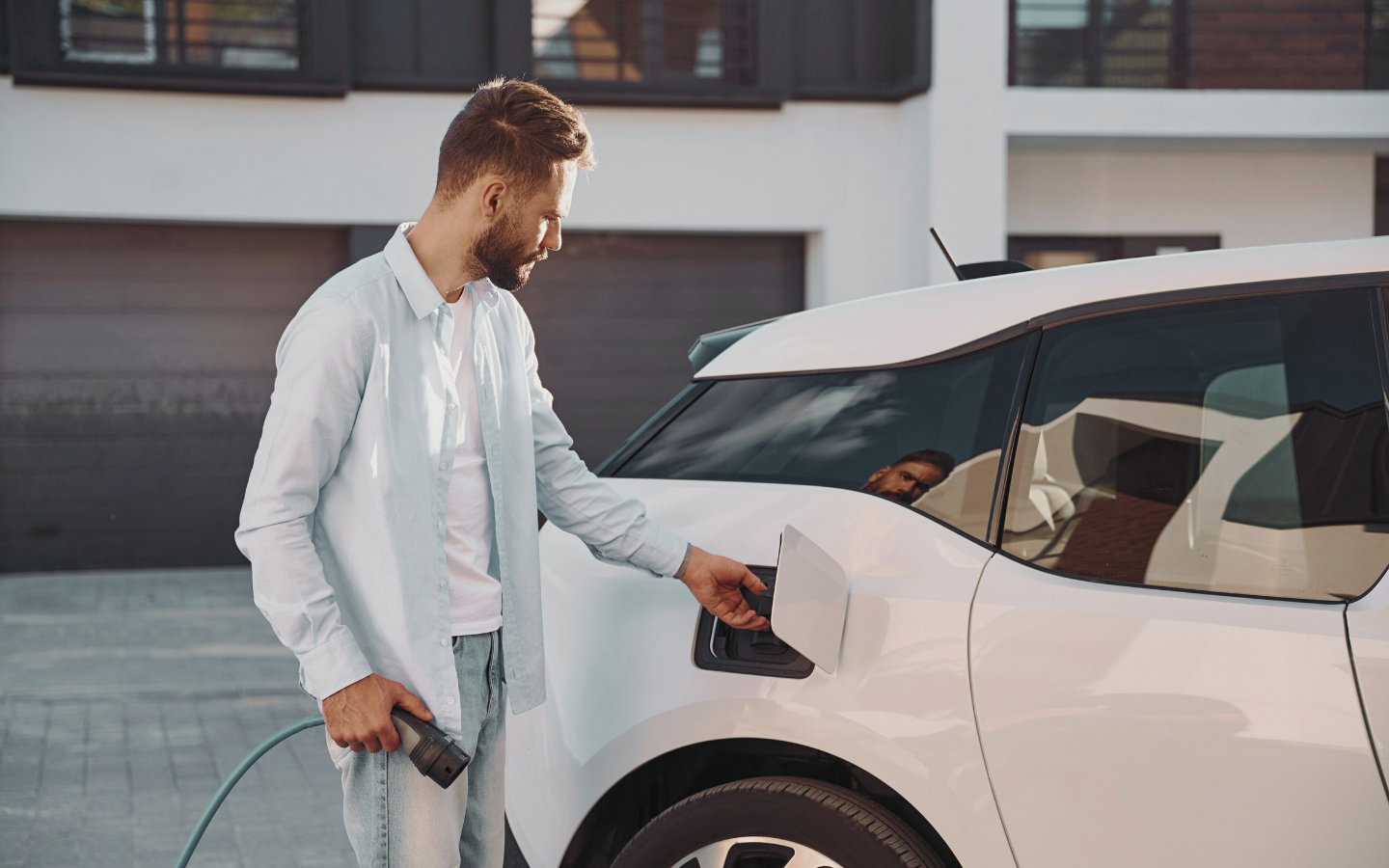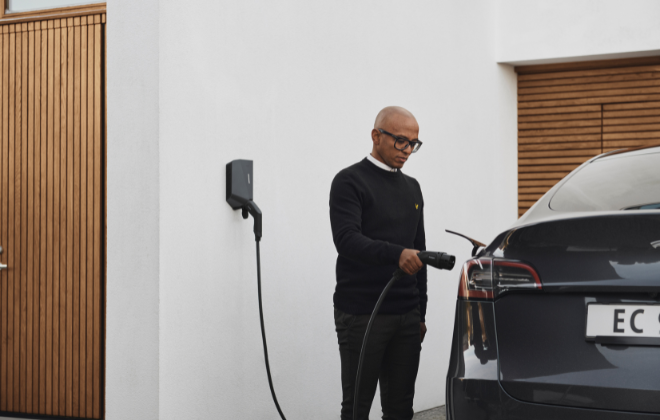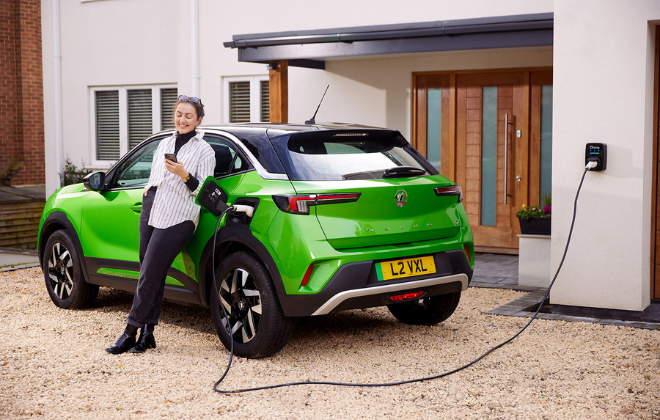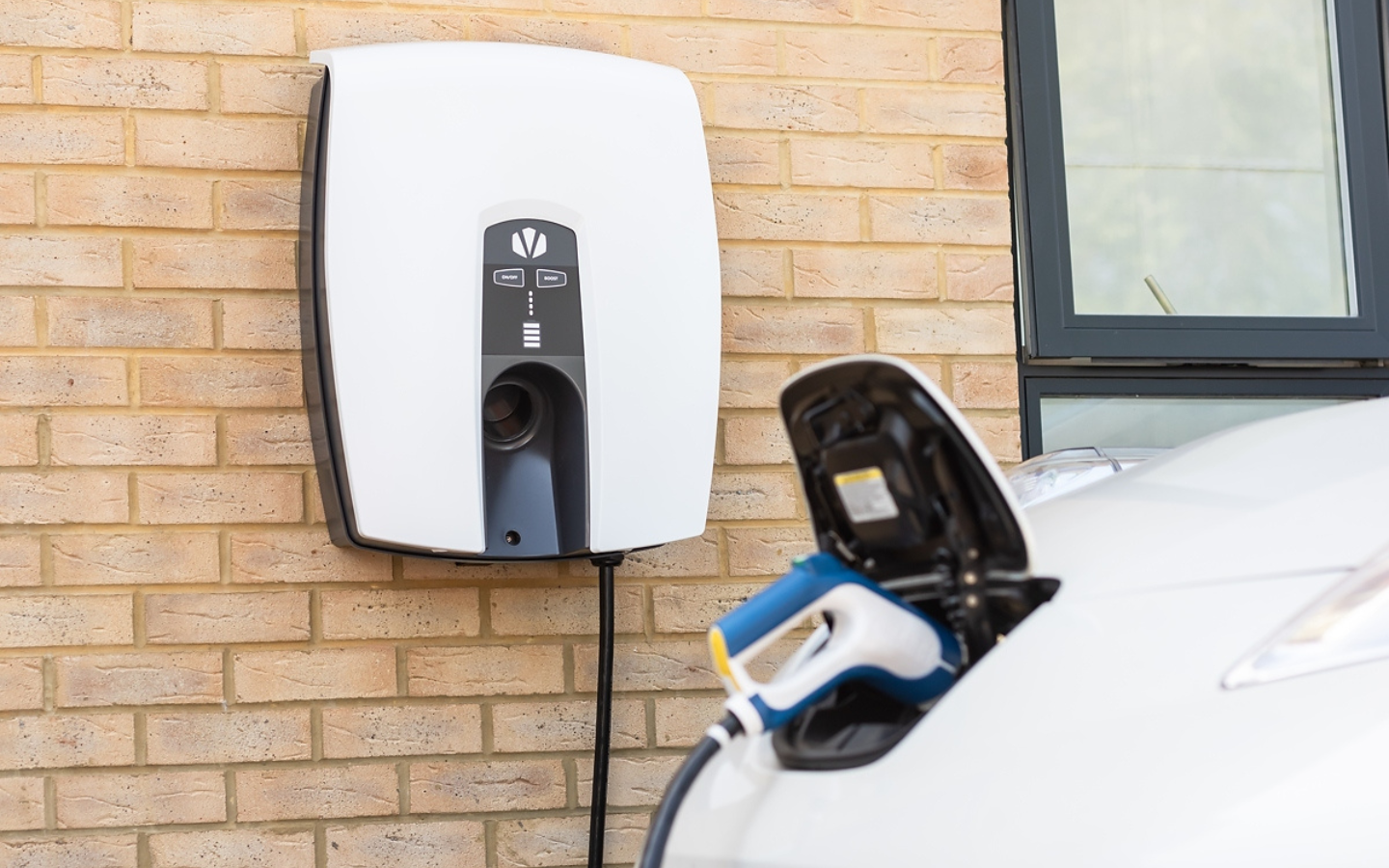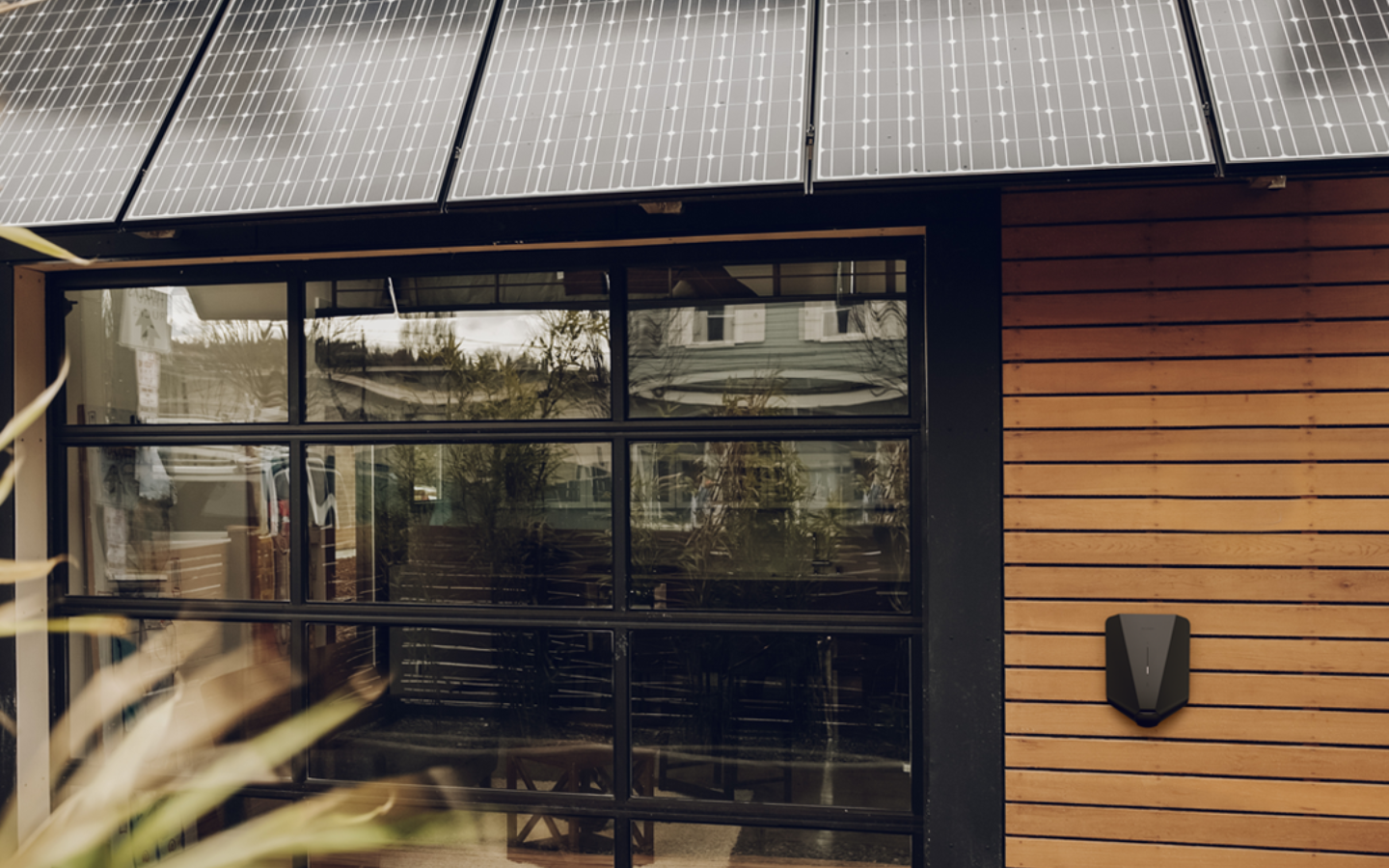

Solar EV Charging: A Guide
As renewable energy sources gain momentum due to the threat of global warming, many electric vehicle (EV) owners are exploring the possibility of having a solar electric car charger installed at home. Many electric car drivers are asking the questions – can you charge an EV with solar panels? Are there solar compatible electric car chargers? Which are the best solar EV chargers on the market?
Keep reading to find out everything about solar electric car chargers, exploring the pros and cons of solar EV charging, considerations and practical steps involved in investing in a solar EV charger.
Can you charge an electric car with solar panels?
The answer, in its simplest form, is yes, you can charge your electric car with solar panels – as long as you have a solar PV system and a solar compatible EV charger. Using solar panels to charge electric cars can lower electricity bills and decrease your carbon footprint.
What are the pros of charging your electric car with solar panels?
Solar-powered EV charging offers several benefits for UK drivers, the environment and the grid.
Here are the pros of solar EV charging:
1. Lower carbon emissions
As an electric vehicle driver, you’ll be aware of the environmental benefits of EVs over petrol and diesel cars – perhaps this was one of the reasons you switched to electric. But by charging your EV with solar, you can reduce your carbon footprint even further by topping up with clean, renewable solar energy instead of only using energy from the grid.
2. Reduce electricity bills
With the cost-of-living crisis in the UK, it’s no wonder people are searching for ways to cut down on bills, especially electricity costs. By investing in an EV solar charger, you’ll have to rely less on your electricity supplier and can top-up with solar-powered energy that you’ve generated for free – which is undoubtedly cheaper than solely using electricity from the National Grid.
3. Increase property value
Not only does installing an electric vehicle charger on your property increase its value (up by 13%), but installing solar panels will send your property’s value soaring further. In fact, solar panels are said to increase your house’s value by an average of £32,459 in the UK. Of course, this depends on a number of factors, including the size of the PV system and the location of the house.
Not only does a home EV charging point add value to your house, but with the addition of solar panels and a solar-compatible EV charger, your house’s value will skyrocket.
4. Grid stability
By utilising your solar energy, you can charge ‘off-grid’, meaning you’ll help distribute energy demand and put less strain on the grid.
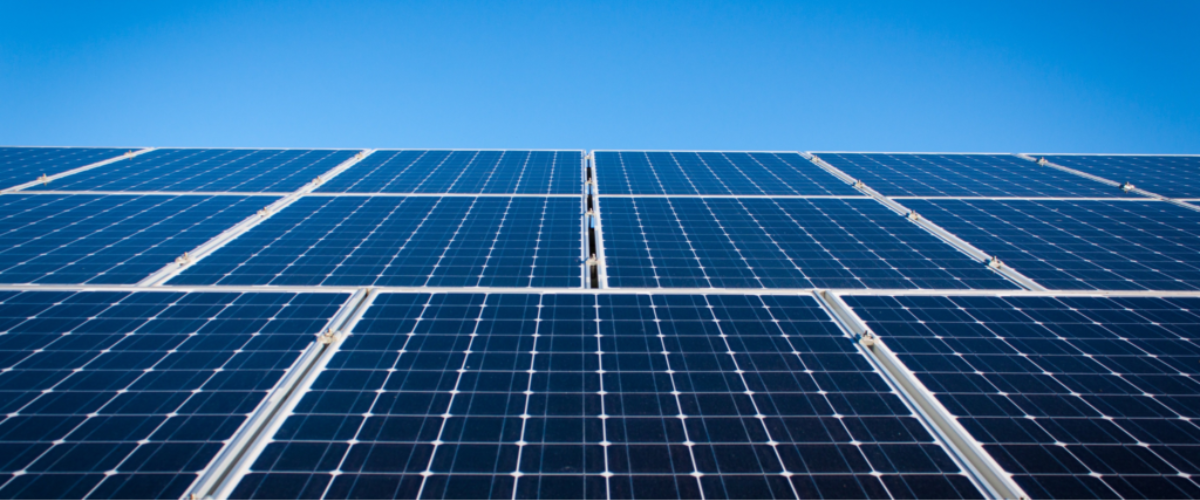
What do you need at home to charge your electric car with solar energy?
First and foremost, to be able to charge your electric car with solar energy, you will need the following:
- A solar PV system (including solar panels and an inverter)
- An electric car
- A dedicated smart home EV charger on your property (with solar charging capabilities)
- Battery Storage (optional)
How do solar electric car chargers work?
- Your solar panels (made from photovoltaic cells) absorb sunlight and convert the energy into DC electricity (direct current)
- Your inverter (part of your solar PV system) will convert the DC electricity generated from your solar panels into AC electricity (AC, or alternating current, is used to power UK households)
- The converted AC electricity travels to your distribution board and is spread throughout your home, powering your appliances! If excess power is produced, it will be fed back into the National Grid unless you have battery storage.
- If you have a solar electric car charger, the unit will use the converted electricity to charge your EV
How many solar panels do I need to charge an electric car in the UK?
The size of the solar panel’s array will depend on how much energy you need to charge your EV. Simply put, the larger your EV battery, the more solar panels you will need to substantially charge your electric car.
On average, ten solar panels is the sweet spot to be able to charge your electric car with solar, with a minimum of at least eight. That being said, the number of solar panels required depends on a variety of factors, including how large your EV battery is, in addition to how much energy you are/will be using in the house. For example, it’s unlikely that eight solar panels will be enough for a Tesla Model 3.
How long will it take to charge my EV with solar?
There is no clear-cut answer as to how long it will take to charge an electric car with a solar EV charger. In actuality, a number of factors play a part in the charging speed of an electric car in general – but more so for solar EV charging. For example, charging time will depend on the size of your EV’s battery, how many solar panels you have installed on your property, and how much solar electricity you produce on a daily basis.
That being said, roughly, solar panels can generate anywhere between 1kW to 4kW at home, which for a smaller electric car, such as the Nissan Leaf, can charge your EV in 8-10 hours.

Can any electric vehicle be charged with solar energy?
Yes, any electric vehicle can be charged with solar as long as you have the correct equipment (solar PV system and solar EV charger) – you don’t need a specific electric car model.
Do I need a specific solar PV system to work with an EV charger?
No, any solar PV system (as long as they include solar panels and an inverter) will work with all our smart solar chargers – you don’t need to invest in any specific infrastructure.
What is battery storage?
Battery storage does what it says on the tin – it’s a battery that stores excess energy inside, such as electricity generated from solar and wind. You can then use this saved energy at a later date instead of it being fed back into the National Grid.
For instance, you could store excess solar energy in your battery store that was harnessed during the day and then use that energy to charge your EV during the night (when you wouldn’t otherwise be able to charge with solar power). One of the most popular battery stores is the Tesla Powerwall.
Do I need a battery storage system to charge my EV with solar?
In terms of home solar EV charging, the answer is no – you don’t need battery storage for it to work. With all solar electric car chargers, you can simply plug your EV in when your PV system is generating solar energy, and your EV will charge.
There are benefits to battery storage, though. For example, as previously mentioned, you cannot charge during the night with solar. So, to ensure the lowest carbon charging method, or if your preferred charging time is in the evening, you could save solar energy in a battery store and then use it at night. Or, you could charge your battery storage with electricity generated from your solar panels every day, even when you don’t need to top up your EV. You could then use the saved energy when you desperately need to fully charge on another day. By storing excess energy, you decrease dependency on the Grid and become more self-sufficient too.
On the other hand, some solar electric car chargers can’t coordinate with battery storage, meaning you would only charge when plugged in and the sun is out. Battery storage can also be an expensive investment.
All in all, it’s a personal preference as to whether you invest in battery storage.
Do I need a specific EV charger to charge with solar?
Yes, to charge your electric car with solar panels, you will need a solar-compatible EV charger.
Typically, if the charger is solar compatible, you will usually need to purchase an add-on to be able to charge with solar. On the other hand, if an EV charger is solar-ready, the unit is capable of charging your EV on its own, and an add-on cost isn’t needed for it to do so.
What is the best EV charger for solar panels?
Having tried and tested multiple solar electric vehicle chargers, we feel the best EV chargers for solar panels are the VCHRGD Seven and the Zappi. The VCHRGD places top in terms of being the best EV charger for solar panels based on cost. On the other hand, the Zappi is the number one charger if you value more complex solar EV charging.

Are solar panel electric car chargers worth it?
Overall, the benefits of solar EV chargers– cheaper and cleaner energy, especially – make investing in a solar charger worthwhile. Moreover, with the exception of the Zappi, you wouldn’t need to break the bank by choosing a home EV charger with solar capabilities over one that doesn’t. Why? Because typically, EV chargers with solar integration are around the same price as home EV chargers without (for example, the VCHRGD Seven).
To fully access everything the Zappi has to offer, you would need to invest in their range of products, such as the Eddi and the Harvi, which add up quickly. So, unless you want to charge with wind-generated power or you want to divert excess energy back into your heating systems, other solar chargers will do the job at a cheaper cost.
Of course, you’ll need a solar PV system at home for solar EV charging to work. With this in mind, if you don’t have a solar PV system, it would be a hefty investment and need further deliberation. That being said, by investing in a solar unit for the same price, you are guaranteed a future-proof unit, so if you decide to invest in solar panels in the future, you are good to go.
Key considerations for solar electric car charging:
1. Weather conditions
Despite the fact that your solar PV system will still take energy during grey or cloudy weather, you’re more likely to generate electricity when the sun is at its brightest. And, of course, you’ll need to take into consideration that your EV won’t charge overnight with solar unless you invest in a battery storage system. So, manage your expectations, as you won’t be able to charge your EV with solar energy whenever you want.
2. High upfront cost of a solar PV system
The initial cost of a solar PV system is in the thousands. The exact cost depends on a number of factors, including what kW system you go for, but a 4kW solar PV system costs somewhere between £6,000-8,000. In terms of solar EV chargers, they typically have a similar cost to their non-solar counterparts, so it’s only the high cost of the solar PV system that you need to think about.
3. Minimum kW
Solar PV systems need to generate a minimum of 1.4kW above that required to power your home in order to charge your EV. Be mindful that if you want to charge frequently with solar energy, you need to have a sufficient number of solar panels. In our opinion, we’d recommend supplementing the rest of your EV charge with power from the grid on the days when your solar-generated energy is lacking, especially in the winter months.
Conclusion: Is it worth installing a solar EV charger at home?
Yes, we feel it is definitively worth installing a solar EV charger at home – if you have a solar PV system, that is. One of the core reasons is because by taking advantage of surplus solar energy, you can lower home EV charging costs further. Not only that, but you are supporting a more sustainable future, reducing carbon emissions by using renewable energy.
Summary:
- The pros of solar electric car chargers include lower carbon emissions, reduced electricity bills, increased property value and grid stability.
- You need a solar PV system, an electric car and a solar electric car charger to be able to charge your electric car with solar panels.
- On average, you need about ten solar panels to charge your electric car – however, it’s unlikely you’ll have enough solar panels to charge your EV fully.
- The best solar electric car chargers are the VCHRGD Seven and the Zappi.
Interested in a solar electric car charger?
We offer a wide range of market-leading EV chargers, including solar electric car chargers. Browse our solar car chargers, or, alternatively, if you have a solar car charger in mind, contact a member of our team directly on 03333 44 96 99. Our expert customer service team are available to offer free, unbiased advice seven days a week, including bank holidays.
And with engineers across the UK, we can EV chargers install nationwide – all with first-class customer service.
For more information and our latest updates, follow us on Facebook, Instagram, Twitter, LinkedIn and YouTube.
related articles
Stay up to date on the latest from We power your car_
I consent to receive newsletters from We Power Your Car. Please see our Privacy Policy
